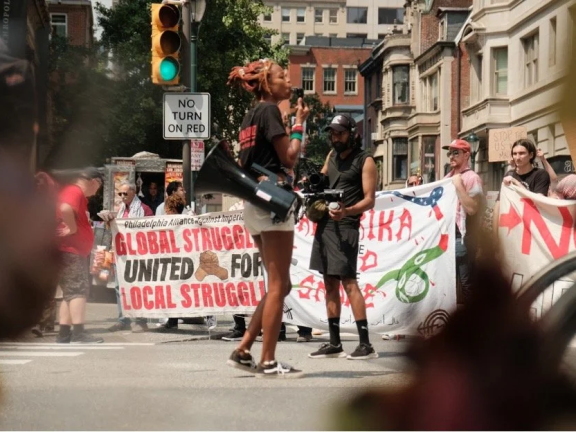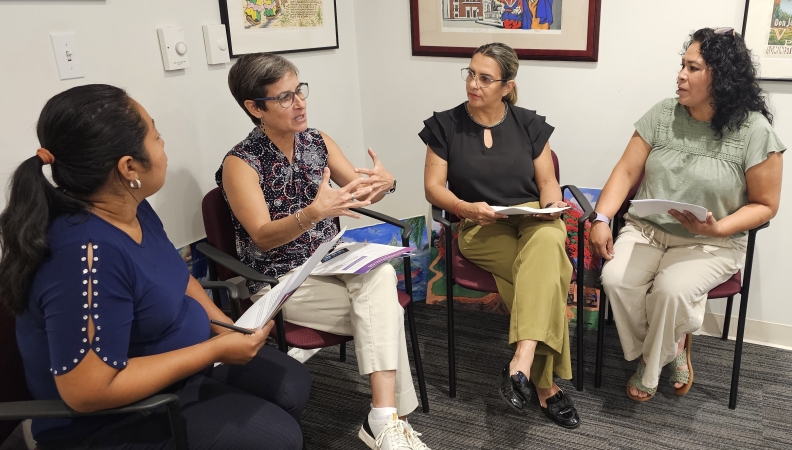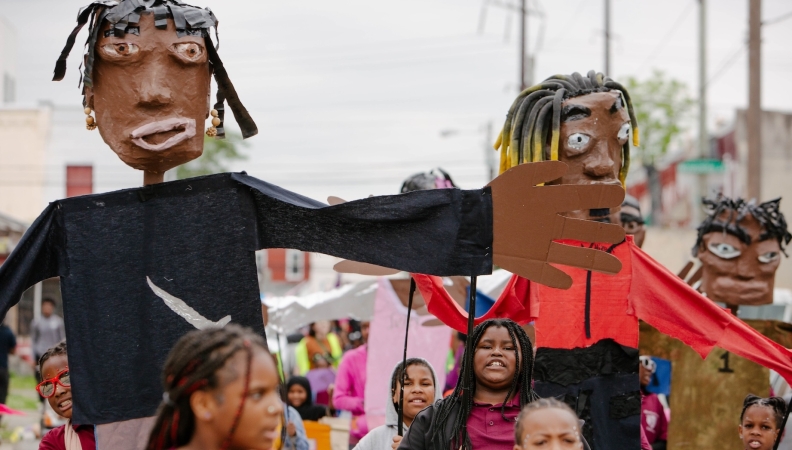Training Emerging Journalists to Reclaim SWANA Narratives

Elissa Odeh often noticed the disconnect between the lives she knew and the headlines she read. As a Palestinian, the media’s portrayals of her community were narrow and dehumanizing, and cast them as vilified, neglected, and perpetually at war. Those distorted images planted a seed of determination, and she felt called to journalism not just to report, but to rewrite the record.
That calling led her to the Al-Bustan News Service Fellowship, where she found a pathway to serve the Arab communities she longed to uplift. Through the fellowship, Elissa encountered a spectrum of Southwest Asian and North African (SWANA) voices—chefs, therapists, artists—each sharing their traditions, struggles, and triumphs.
“I met remarkably diverse SWANA voices who showcased the richness of our cultures and reaffirmed why this work matters,” Elissa said. “Through each interview, I caught glimpses of my own story reflected back at me, deepening my understanding of how connected we are by a shared desire to seek truth and preserve identity and culture despite the challenges of the diaspora.”
Al-Bustan, a Philadelphia-based organization, is training emerging journalists like Elissa to push against anti-Arab narratives and the rising tide of journalistic censorship in the U.S. by amplifying, supporting, and sustaining the stories of the underrepresented SWANA communities in the region.
The organization offers civic engagement opportunities and educational programming that aim to enrich understanding of and celebrate the diversity of Arab American cultural identity. And through its News Service Fellowship, Al-Bustan is championing a new generation of journalists and storytellers to counter harmful narratives with stories of joy, culture, and truth.

Photo from an Al-Bustan article about Middle Eastern and North African Fashion. Credit: Kenza Bousseloub
These early-career journalists capture the full spectrum of the Arab-American experience, while developing their voices and skills. Fellow features include stories on mental health, analyses of Middle Eastern and North African fashion trends, and delicate explorations of the complex perspectives surrounding the genocide in Gaza.
"Originally, our plan was simply to create a platform to tell stories that weren’t being told elsewhere. But as the News Service Fellowship grew, we discovered fellows also valued the opportunity to connect to their communities, establish their beat, and dive deeper into the cultures,” shared Nisa Qazi, editor of Al-Bustan’s News Service.
Amid the misrepresentation and suppression of SWANA experiences, the fellowship aims to protect these communities' stories and disrupt the harmful narratives that have flourished at an alarming rate amid growing racism towards Palestinian-Americans, Arab-Americans, and Muslim-Americans since the events of October 7th, 2023.
“Al-Bustan has always worked to enrich the SWANA diaspora by providing spaces for people to share their cultures and experiences. The News Service is the natural next step in the mission,” explains Nisa. “Having the opportunity to mentor media fellows at the beginning of their careers and help them develop their skills has been absolutely amazing, particularly now when these stories are being suppressed.”
By hiring and supporting emerging journalists from SWANA communities, Al-Bustan has created a symbiotic cycle of growth and connection. The journalists deepen their understanding of their own cultures while exploring surrounding communities. Meanwhile, communities that have long seen their grief, joy, pain, and traditions censored or misrepresented can finally share these experiences directly with the world. Through each story published and each writer mentored, this experience transforms their careers as well as the narrative landscape surrounding SWANA communities in America.
“My fellowship at Al-Bustan became a compass: an experience where I truly found myself as a journalist, and one that will continue to guide my future endeavours as I stay committed to amplifying the untold stories of our communities,” shared Elissa Odeh.
Many program alumni have expanded beyond their initial roles, now regularly pitching columns and articles while deepening the relationships built during their fellowship. Elissa Odeh, who completed her fellowship in February 2025, continues to work with Al-Bustan as a freelancer and recently published a piece highlighting the work of composer and performer Jiryis Murkus Ballan. Odeh weaves together Ballan's personal narrative and artistic drive, exploring how he blends cultural traditions with personal identity through electronic experimental music featuring the buzuq, a traditional Levantine stringed instrument.

Photo journalism about a Philadelphia rally against genocide in Gaza. Credit: Ben Bennett
Stories on the news platform are expansive, featuring arts coverage, profiles of small businesses, and reporting on issues affecting immigrant communities in the Philadelphia region. Beyond traditional articles, the team is experimenting with photojournalism, film reviews, and interactive storytelling. Writer Ben Bennett’s piece, “In Photos: Philadelphians Rally Against Genocide in Gaza and Strikes on Iran,” captures the energy of the movement, dropping viewers directly into the moment and revealing the many faces and emotions tied to the complex event.
Another Fellow, Ragad Ahmad, shares glimpses into the local businesses whose creations are inherent acts of resistance; whether in connecting Palestinians across the sea through transnational olive oil or through preserving a grandmother’s recipe book to share with their community via a local bakery, Ahmad shows us that there is beauty in the intersection of food, culture, and identity. For the communities whose stories have long been told by others, Al-Bustan offers something inspiring: the chance to speak for themselves.
As they continue to amplify voices in a political climate where sharing stories about these communities can endanger writers’ immigration status or even their safety, the Al-Bustan team collaborates with a media initiative from City University of New York (CUNY) that works to support journalists at outlets under threat. While it's crucial to amplify and support SWANA writers, Al-Bustan also understands the importance of providing both moral support and protective measures.
“We strive to continue to tell these stories whenever possible despite the threat of collapse all around us,” said Nisa.
It has been a delicate balance for Al-Bustan to center stories from the SWANA communities while also protecting those very communities and the writers behind the coverage. By continuing to lift these voices from the shadows of censorship, the organization proves that the most powerful response to suppression is simply refusing to be silent.
Photo credits: Ben Bennett and Kenza Bousseloub for Al-Bustan News Service



